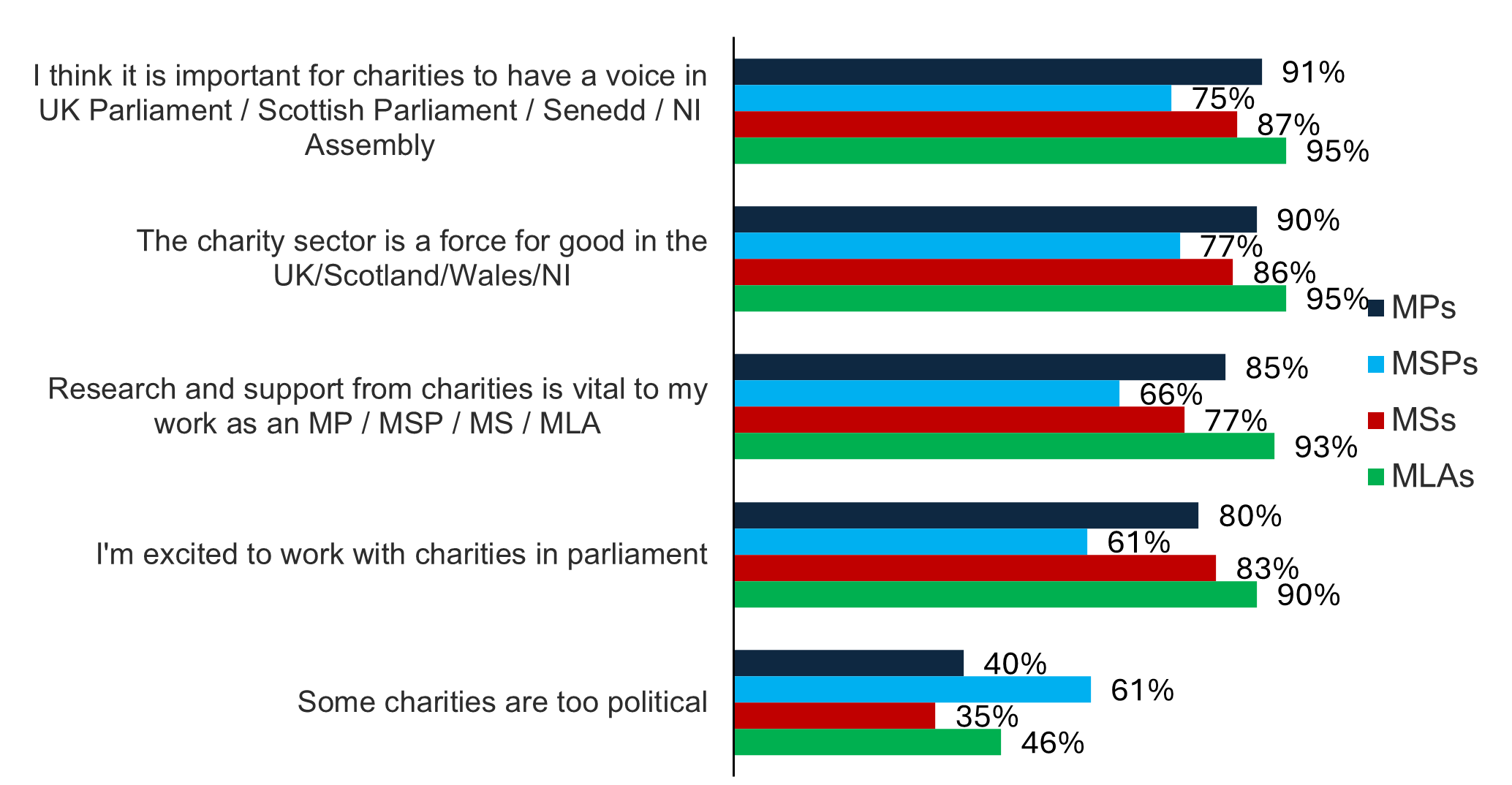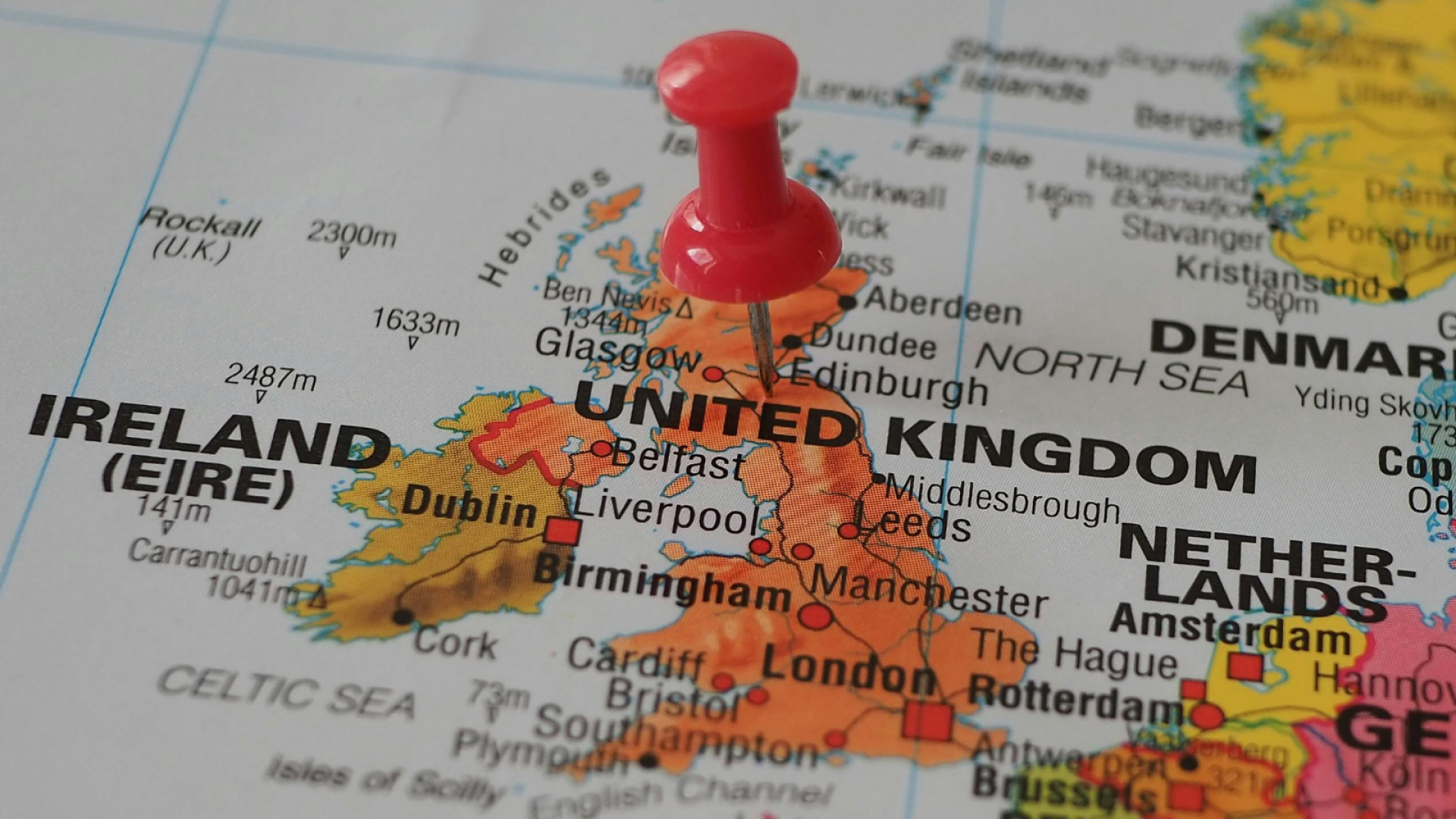With elections in Scotland and Wales less than a year away – and Northern Ireland to follow in 2027 – now is a timely moment for charities to reflect on how politicians across the UK are engaging with the sector. As manifestos are drafted and campaigning begins to ramp up, it’s worth considering the current attitudes of devolved politicians. Recent surveys we conducted offer a revealing picture: Members of the Legislative Assembly (MLAs) in Northern Ireland appear to lead the way when it comes to valuing and engaging with charities.
Figure 1: Attitudes towards charities

"To what extent do you agree or disagree with the following statements about work with charities?" Strongly agree + Agree, Source: nfpPolitics Westminster, Holyrood, Senedd & Stormont: October 2024 | Base: 100 MPs, 40 MSPs, 30 MSs, 33 MLAs
Stormont’s unique relationship with charities
The data shows MLAs consistently ranking highest in agreement across nearly all statements. A striking 95% agree that charities should have a voice in the Assembly – more than their counterparts at Westminster (91%), the Scottish Parliament (75%) or the Senedd (87%). A similar number see charities as a force for good, and 93% say that research and support from charities is vital to their work.
These findings are encouraging for organisations operating in Northern Ireland and point to a sector that enjoys trust and relevance within Stormont’s political processes. This may reflect Northern Ireland’s distinctive social, political and cultural context. The power-sharing arrangements established by the Good Friday Agreement in 1998 have underlined the importance of working closely with communities and civil society to maintain public confidence. This environment seems to foster a naturally collaborative relationship between MLAs and the sector.
It’s also worth noting that the Assembly has experienced significant periods of suspension in recent years, which may have created a less pressurised political space in which charities can engage. Either way, the consistently high levels of openness among MLAs offer a valuable opportunity for organisations to advocate, influence and build meaningful partnerships – positive signs as we look ahead to 2027 and beyond.
Scotland: A cooler climate for collaboration?
By contrast, the picture in the Scottish Parliament is a little more reserved. While most MSPs remain supportive, their levels of agreement are lower across several key areas. Just 75% believe charities should have a voice in Parliament – the lowest of any UK legislature surveyed. Meanwhile, only 61% say they are excited to work with charities, compared with 90% of MLAs.
These findings suggest a more cautious political climate for collaboration in Scotland. Our data shows that SNP MSPs in particular are less likely to agree with positive statements about the sector. The reasons for this are likely complex, but the party’s long tenure in government, combined with recent electoral challenges and high-profile controversies, may be factors. Several SNP MSPs have already announced they won’t stand again in 2026, adding to the sense of disengagement. In this context, some may be more resistant to external scrutiny or policy influence.
Nonetheless, the SNP remains a dominant political force and could well retain power after the next election. For charities, continued engagement with SNP MSPs remains essential – particularly as manifesto development gathers pace.
Wales: Warm attitudes, with room to grow ties with Plaid
In Wales, Members of the Senedd (MSs) generally show strong support for the role of charities in public life. A clear majority see the sector as a force for good, believe it should have a voice in the Senedd and value the research and insight it provides. Many also say they are enthusiastic about working with charities – a positive signal ahead of the 2026 election.
Party-level data from the Senedd reveals that Labour MSs are the most enthusiastic, ahead of both Conservative and Plaid Cymru members. While Plaid MSs remain broadly supportive, their responses are more cautious in tone. This suggests there is still scope to strengthen relationships and build greater trust with the party – especially important given recent polling that places Plaid and Labour neck and neck.
Navigating a changing political landscape
Looking ahead, the stakes are high for next year’s devolved elections in Scotland and Wales. Current polling suggests both nations could experience notable political shifts. Labour’s historic dominance in Wales is no longer a given, while the rise of Reform UK could reshape familiar patterns. In both countries, proportional voting systems and the potential emergence of new parties may lead to a more fragmented political map.
In Northern Ireland, politics will no doubt continue to evolve, but the strong level of MLA support offers a stable foundation for deeper collaboration with charities in the run-up to 2027.
In this changing landscape, it’s essential that charities engage with a broad spectrum of political actors. Cross-party support will be crucial to ensuring the sector’s priorities are understood and championed within devolved institutions. Acting now to build those relationships will help keep the sector front of mind as manifestos take shape.
For more insights, contact with nfp Head of Projects, Peter Dawson.

